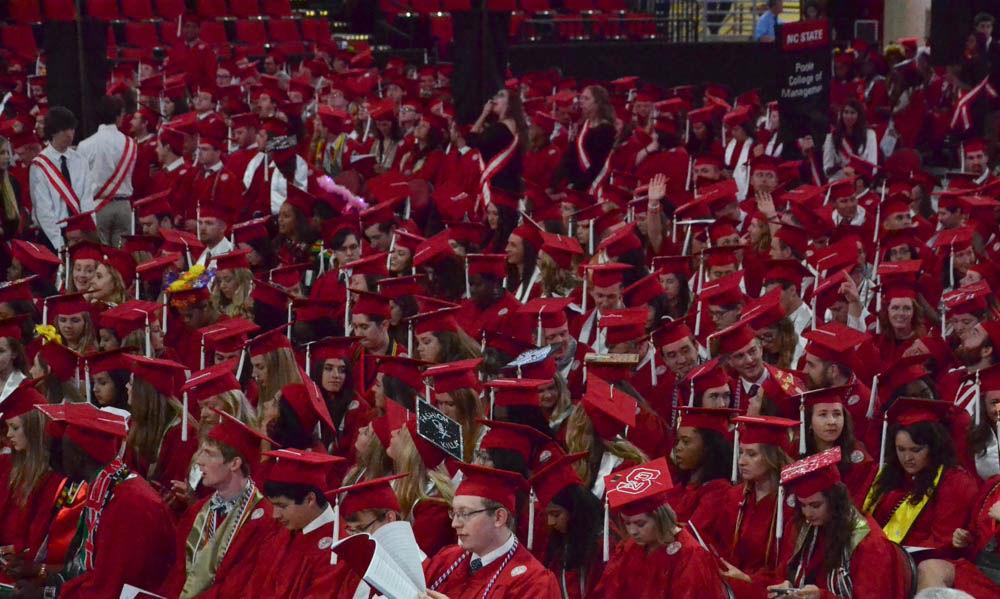An academic honors regulation may prevent transfer students at NC State from receiving certain honors otherwise granted upon graduation.
Regulation 02.30.01 of Academic Honors at NC State states that students must receive 100 cumulative credit hours at NC State in order to graduate valedictorian, salutatorian or highest ranking scholar in a college. However, this regulation does not take into consideration the credit hours that students who transferred to NC State earned at other universities. Without a year of credit hours, transfer students are largely disqualified from graduating with these honors.
Louis D. Hunt, the senior vice provost for enrollment management and services and university registrar, described the original reasoning for the regulation.
“It’s kind of to ensure that you’ve taken coursework here and that you’ve been successful in the rigors of the NC State curriculum,” Hunt said. “It’s been OK; as we’ve gotten more transfer students, it’s become a bit of an issue.”
As the amount of transfer students increases, NC State is attempting to make more efforts to accommodate the expanding demographic.
“We’re trying to do a lot of things to make the campus more friendly for campus students and to acknowledge that they are important to our campus and everything,” Hunt said. “I think this is one we should probably do.”
Morgan Duncan, a second-year studying psychology, transferred from East Carolina University and felt that the current regulation was unfair to students who had transferred to NC State.
“I don’t really think that’s fair,” Duncan said. “I feel like if you’re putting in the work you should get just as much credit as anyone else and a lot of people have a lot of different circumstances.”
Duncan also believed that transferring to NC State had a positive effect on her time management and work ethic, resulting in transfer students putting in extra effort.
“I think coming from ECU to a school like NC State where there are a lot of people in really intense majors and stuff, it makes you work a lot harder,” Duncan said. “I feel like that’s what I’m around, is people who focus a lot on their studies.”
Diego Bryan, a second-year studying civil engineering and transfer student from Wake Technical Community College in Raleigh, expressed the difficulty of transferring to NC State.
“It’s not easy for one to transfer into NC State,” said Bryan. “Especially for engineering, I had to get like 3.9 [GPA] and I got turned down one time.”
He also described the additional challenges that transfer students face as a direct result of their GPA not transferring over from their original university.
“I also had my GPA reset, so I’m taking all these hard classes with a 0 GPA so that’s a little frustrating,” Bryan said. “I can’t apply for scholarships right now because I have a 0 GPA.”
Libby Pelt, a third-year studying chemical engineering, transferred from University of Pittsburgh to NC State and saw some of the reasoning to the policy but still had her reservations due to implications the regulation had on her GPA.
“I can kind of see why it makes sense, but also I’m a student here. … I still take my classes here,” Pelt said. “It also makes it so my classes here count more. They’re higher weighted so I don’t have freshmen classes kind of padding my GPA.”
Being 33 years since the last revision, Hunt expressed support for a change and briefly summarized how that change might happen.
“Generally we would start with the Academic Policy Committee, a committee of the faculty senate,” Hunt said. “They sort of have governance over academic policies like this.”
Students wishing to find out more about the regulation can visit the Registration and Records office in Harris Hall or visit their website.
The NC State valedictorians look towards the stage for their graduation ceremony on Saturday, May 13, 2017 in PNC Arena. Valedictorians must have entered their final semester of college with a 4.0 GPA and are recognizable, along with the Summa Cum Laude, those who have graduated with a GPA of 3.75 and above, by their gold stoles.









